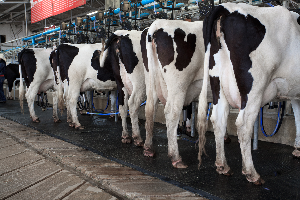SER: Huidige veehouderij onhoudbaar. Ingrijpen noodzakelijk
De SER (Sociaal-Economische Raad) concludeert in haar rapport ‘Versnelling duurzame veehouderij’ dat versneld ingrijpen in de huidige veehouderij noodzakelijk is. De overheid moet een krachtige regierol op zich nemen en alleen de ‘voorhoede’, naar schatting zo’n 30% van de veehouders, zou ondersteund moeten worden. De rest zou in staat moeten worden gesteld om te stoppen. De Partij voor de Dieren is het eens met deze aanbevelingen van de SER. Eveneens met de conclusie dat de tijden van zelfregulering en goede voornemens voorbij zijn. Fractievoorzitter Marianne Thieme wil een debat met de staatssecretaris over de dringende aanbevelingen.

Volgens de SER is het essentieel om de voorhoede van duurzame veehouderijen, die onder andere dierenwelzijn, volksgezondheid en innovatie het hoogst in het vaandel hebben staan, gericht te versterken en te ondersteunen. De SER is evenals de Partij voor de Dieren van mening dat een krachtige regierol voor de overheid is weggelegd om de verduurzaming van de landbouw eindelijk ter hand te nemen.
‘Terecht stelt de SER dat de tijd van vrijblijvendheid en loze beloften van de veehouderij voorbij is’, zegt Marianne Thieme in reactie op het SER-advies. ‘De vee-industrie is onhoudbaar, voor zowel boeren als voor dieren, milieu en volksgezondheid. Zelfregulering in de veehouderij heeft niets goeds gebracht en de overheid heeft haar verantwoordelijkheid laten liggen. Vele adviesorganen van de regering hebben de noodklok geluid: het Planbureau voor de Leefomgeving, de Wetenschappelijke Raad voor het Regeringsbeleid en nu ook de SER. De maat is vol.’
De Partij voor de Dieren wil dat er alleen nog geïnvesteerd wordt in duurzame biologische landbouw. De overheid moet overgaan tot drastische inkrimping van de veestapel. Het inkomen van varkensbedrijven bestaat op dit moment voor ruim 37 procent uit subsidies, dat van melkveebedrijven voor zo’n 60 procent, en vleeskalverbedrijven zijn voor ruim 92 procent afhankelijk van subsidies.
The SER (Social and Economic Council of the Netherlands) has concluded in its report on accelerating sustainable farming that accelerated action against current livestock farming is essential. The government will need to play a strong director’s role and only the “vanguard” of sustainable livestock farmers – about 30 % of all Dutch farmers – should receive financial support. The remaining farmers should be enabled to stop farming. The Party for the Animals agrees with the SER’s recommendations, as well as the conclusion that the days of self-regulation and good intentions are over. Chairman Marianne Thieme seeks to hold a debate with the State Secretary on these urgent recommendations.

According to the SER, providing specific enforcement and support to the vanguard of sustainable farmers, who give the highest priority to animal welfare, public health and innovation among other things, is essential. As well as the Party for the Animals, the SER believes that herein lies an important director’s role for the government to finally take up the task of sustainable livestock farming.
“The SER is right in saying that the days of non-commitment and empty promises are over,” Marianne Thieme says in response to the recommendations of the SER. “Livestock farming is unsustainable, for farmers as well as animals, environment and public health. Self-regulation has not benefited farming in any way, and the government has taken no responsibility. Many government advisory bodies have sounded the alarm: the Netherlands Environmental Assessment Agency, the Scientific Council for Government Policy and now the SER. It is time to start listening.”
The Party for the Animals wants the government to invest only in sustainable, organic farming. Cattle numbers should be drastically reduced. At present, over 37 percent of a pig holding income is dependent on subsidies, as well as 60 percent of a dairy farm income and more than 92 percent of a veal calf holding income.